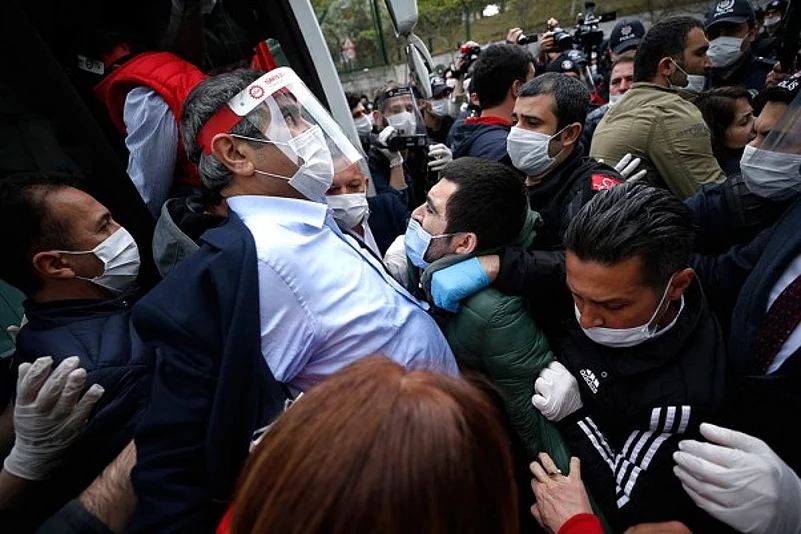The spectre of pandemic-led crisis and its relationship with social transformation is not new. The Plague of Justinian and the Black Death had huge impact on weakening of feudalism in Europe. It did not pave the path for democratic movements in Europe but made people conscious about the difference in sufferings. The masses suffered in different plagues while the feudal ruling class protected themselves within their forts and castles. The political landscape in Europe changed after the pandemic. The agrarian capitalism in England, decentralised oligarchical commercial capitalism in Italy, partnership between aristocracy and monarchy in France and Spain led to the consolidation of capitalism and rise of authoritarian state in Europe. People’s resistance movements and sacrifice paved the path for democracy in different parts of Europe. The history is repeating itself during this Coronavirus crisis in which rich live with their abundance, and masses suffer in deaths and destitutions. There is also growing tendencies of authoritarianism within and outside Europe.
Since the beginning of this pandemic, the world is experiencing higher growth of poverty, hunger and unemployment. The capitalist states have failed to respond to the crisis in any meaningful manner. Faced with the inability to find solutions, the right-wing ruling classes have unleased reactionary nationalism as a weapon, that provides breathing space to market forces to recover from the crisis. The market forces are doing everything in their power to capture the resources of the state. The states and governments are using lockdown as an opportunity to destroy the democratic space by spreading fear and xenophobia. Many governments are using this crisis to dismantle labour laws that protect the workers and handing over national resources to corporations. The pandemic works like a political lifeline for the authoritarian bigots and capitalist classes. The crisis is proliferating like the mutating power of the Coronavirus. The policy of physical distance is branded as social distancing, which further erodes social ties in the name of defeating the coronavirus from spreading. The social distancing policy is a way of reconfiguration of social and political relations necessary to socialise the fear of the virus and naturalise the crisis in the society.
The American and Eurocentric intellectuals are trying to normalise the crisis as a cyclic process. Such a narrative is already outlined by Willian Strauss and Neil Howe in their book on “The Fourth Turning: An American Prophecy-What the Cycles of History Tell Us About America's Next Rendezvous with Destiny”. The Strauss–Howe generational stage theory is essentialist and functional. It lacks empirical evidence. The old fault lines of class, race and gender continue to exist among different generations. The categories like baby boomers, generation-x and millennials are not helpful to understand social and political transformations. Willian Strauss and Neil Howe’s ideological narrative reflects American determinism based on exceptionalism and perceptions. These perceptions can neither be universal nor can be applied even within American context. Such a myopic theory is reviving during this pandemic as a tool to normalise and naturalise the crisis by diverting attention from the limits of capitalism.
It is within this context, the liberal, progressive, and democratic forces need to develop alternative imaginary based on collective experiences of people during this pandemic. The days of top down approach of managing movements are over. The other traditional forms of social and political mobilisation for a mass movement is not possible under the current situation of social disconnectedness. The social disconnection is the breeding field of apolitical culture, that depoliticises the public consciousness. These are some of the serious ideological and structural constraints for a mass movement against the capitalist plunders during pandemic.
Historically, revolutionary movements emerged during crisis. It is time for the intellectuals, activists and progressive leaders to articulate hopes and dreams of a better alternative that resonates with people, and their everyday experiences. The principle of listening and learning from the people can create conditions of collective empowerment and solidarity. The collective imagination can help in creating political spaces of possibilities of a mass movement, with both short-term goals of achieving people’s basic needs, and long-term visions for future transformations based on human emancipation from poverty, hunger, homelessness and all forms of inequalities. Constructing alternative narratives for this struggle mean rethinking the capitalist conditions of production, distribution and exchange mechanisms within international economic system. It is not about opposing technological automation; technology after all is a product of labour. So, it is about giving labour its due for a comfortable, dignified and leisurely creative life. It is about stopping further environmental damages. The framework of shared experiences and common visions can be used to shape local, national and transnational struggles for liberty, fraternity, equality and justice. The struggle based on sharing and caring can only transform the solitary atomised life under capitalism accelerated by the coronavirus pandemic.
Crisis breeds mass movements both in its progressive and regressive forms. Mass movements lead to social, cultural, economic, and political transformations. The progressive, secular, liberal and democratic transformation of society and state depends on the emancipatory agendas of the mass movements. It is only the progressive mass movements, that fortify our present, shape our future and it will provide ideological directions to all future movements. The digital renaissance depends on our resolve to uphold the spirit of science and reason in one hand, and to fight against individualist market dogmas of capitalism and religious fundamentalism on the other hand.
How can we fight capitalism and Coronavirus pandemic? History offers successful tools for revolutionary mass movements. The Non-Cooperation movement was one such movement which was launched by Mahatma Gandhi against British colonialism in India. The movement crippled the British colonialism in India as Indians stopped working for the British and boycotted British goods in Indian markets. The motto of the movement was based on the simple idea of independence and self-governance. The ‘Non-Cooperation’ as a tool can be used to mobilise and implement resistance movements even during this lockdown. Digital revolution and technological innovations can facilitate the resistance movement. Non-cooperate and boycott all forms of capitalist framework in everyday life can be the starting point in search of a better alternative to the pandemic of capitalism.
(The author is a Senior Lecturer of Business Strategy at Coventry University, UK. Views expressed are personal.)


























